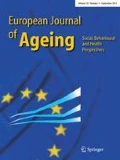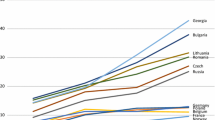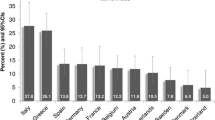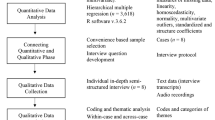Abstract
More than two decades of research has consistently indicated that feelings of loneliness among older people are more common in southern Europe than in its northern parts, with the lowest rates in Denmark and Sweden. Our analyses based on analysis of 2004–2006 data from 8,787 individuals aged 65 years or older in the SHARE project replicate, update, and extend these findings. We found, similar to previous studies, that the prevalence of feelings of loneliness was more common in the Mediterranean countries than in Northern Europe. Living together with a spouse/partner was consistently associated with the lower prevalence of loneliness across countries. The combination of living alone and having bad health was associated with 10 times higher odds of feeling lonely as compared with living together with someone and having good health. With regard to gender and health, we found signs of differences between countries in how these factors were related to loneliness. Our results indicate the importance of both contextual features and cultural expectations in interpreting reported loneliness, that is, loneliness across Europe has both nomothetic and idiographic features.

Similar content being viewed by others
References
Beeson RA (2003) Loneliness and depression in spousal caregivers of Alzheimer’s disease versus non-caregivers spouses. Arch Psychiatr Nurs 17(3):135–143
Börsch-Supan A, Jürges H (eds) (2005). The survey of health, ageing and retirement in Europe—methodology. MEA, Mannheim
CIS (1993) Centro de Investigaciones Sociológicas. Apoyo informal a las personas mayores. Estudio 2072. Madrid
Daatland S-O (1994) Folkemeningen om familien, de eldre og samfunnet. (The popular opinion on family, older people and society). Aldring & Eldre 1:7–12
de Jong Gierveld J (1998) A review of loneliness: concept and definitions, determinants and consequences. Rev Clinl Gerontol 8:73–80
de Jong Gierveld J, Tilburg T (1999) Living arrangements of older adults in the Netherlands and Italy: coresidence values and behaviour and their consequences for loneliness. J Cross-Cult Gerontol 14:1–24
de Jong Gierveld J, Broese van Groenou M, Hoogendoorn AW, Smit JH (2009) Quality of marriages in later life and emotional and social loneliness. J Gerontol 64B:497–506
Dykstra PA (2009) Older adult loneliness: myths and realities. Eur J Ageing 6:91–100
Jylhä M, Jokela J (1990) Individual experience as cultural—a cross-cultural study on loneliness among the elderly. Ageing Soc 10(3):295–315
Killeen C (1997) Loneliness: an epidemic in modern society. J Adv Nurs 28(4):762–770
Korporaal M, Broese van Groenou M, van Tilburg TG (2008) Effects of own and spousal disability on loneliness among older adults. J Aging Health 20:306–325
Ogg J (2006) Heatwave: implications of the 2003 French heat wave for the social care of older people. The Young Foundation: working paper no 2, October 2005. Mimeo
SAS Institute Inc. (2002–2003) The SAS system, release 9.1. SAS Institute, Cary
Sheldon JH (1948) The social medicine of old age. Oxford University Press, Oxford
Socialstyrelsen (1994) Äldre och äldreomsorg i Norden och Europa. (National board of health and welfare. Older people and old age care in the Nordic countries and Europe) Ädelutvärderingen 94:2 (auth. Andersson, L.)
SOU 1977:100 Pensionär ‘75. Intervjuundersökningen. Bilaga B. (Government White Paper 1977 no. 100. The pensioner investigation 1975. Appendix B, The survey study)
Special Eurobarometer 283 (2007). European Commission, Brussels
Stack S (1998) Marriage, family and loneliness: a cross-national study. Sociol Perspect 41(2):415–432
Sundström G (1983) Caring for the aged in welfare society, Stockholm. Stockholm studies in social work: 1. Stockholm, Liber (Diss.)
Sundström G, Malmberg B, Sancho Castiello M, del Barrio É, Castejon P, Tortosa, MA, Johansson L (2008) Family care for elders in Europe: policies and practices. In Szinovacz M, Davey A (eds) Caregiving contexts: cultural, familial, and societal implications. Springer Publishing Company, New York
Tesch-Römer C, von Kondratowitz H-J (2006) Comparative ageing research: a flourishing field in need of theoretical cultivation. Eur J Ageing 3:155–167
Tilburg T, Havens B, de Jong Gierveld J (2004) Loneliness among older adults in the Netherlands, Italy and Canada: a multifaceted comparison. Can J Aging 23(2):169–180
Victor CR, Scambler SJ, Shah S, Cook DG, Harris T, Rink E, de Wilde S (2002) Has loneliness amongst older people increased? An investigation into variations between cohorts. Ageing and society 22(5):585–597
Victor CR, Scambler SJ, Bowling A, Bond J (2005) The prevalence of, and risk factors for, loneliness in later life: a survey of older people in Great Britain. Ageing and Soc 25:357–375
Walker A (1993) Age and attitudes. Main results from a Eurobarometer survey. Commission of the European Communities, Brussels
Walker A, Walker C (2005) The UK: quality of life in old age II. In: Walker A (ed) Growing older in Europe. Open University Press, Maidenhead
Acknowledgments
This article uses data from SHARE Wave 1, as of December 2008. SHARE data collection in 2004–2007 was primarily funded by the European Commission through its 5th and 6th framework programmes (project numbers QLK6-CT-2001-00360; RII-CT-2006-062193; CIT5-CT-2005-028857). Additional funding by the US National Institute on Aging (grant numbers U01 AG09740-13S2; P01 AG005842; P01 AG08291; P30 AG12815; Y1-AG-4553-01; OGHA 04-064; R21 AG025169) as well as by various national sources are gratefully acknowledged (see http://www.share-project.org for a full list of funding institutions). We also are grateful to two anonymous reviewers of an earlier version of the manuscript.
Author information
Authors and Affiliations
Corresponding author
Rights and permissions
About this article
Cite this article
Sundström, G., Fransson, E., Malmberg, B. et al. Loneliness among older Europeans. Eur J Ageing 6, 267–275 (2009). https://doi.org/10.1007/s10433-009-0134-8
Published:
Issue Date:
DOI: https://doi.org/10.1007/s10433-009-0134-8




